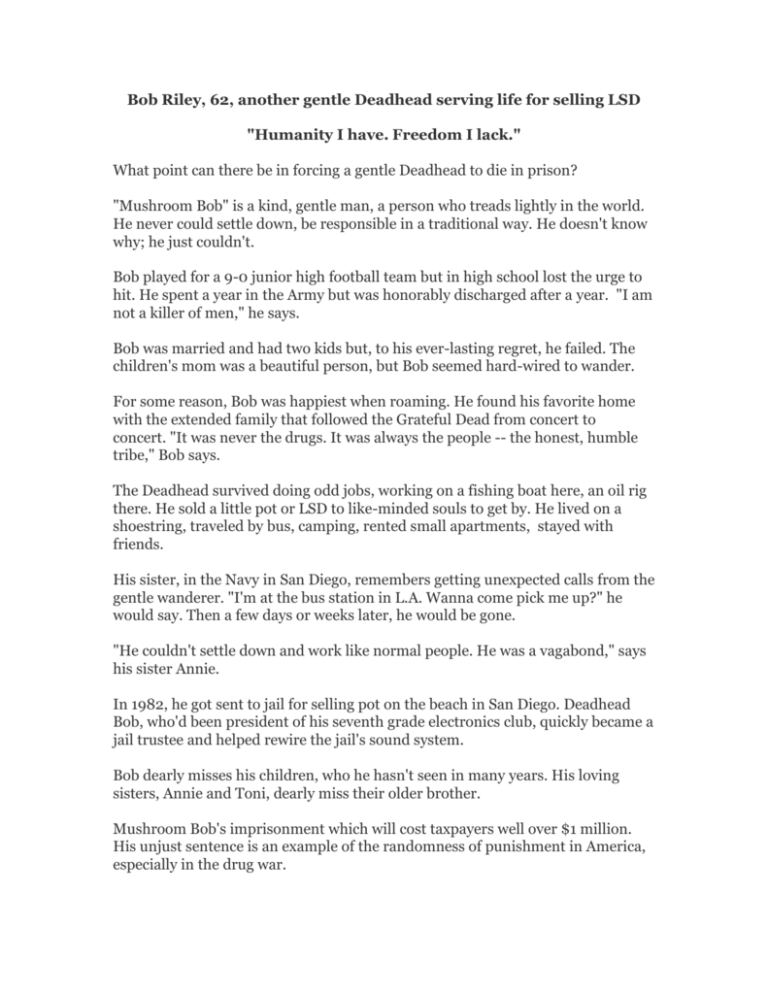Bob-Riley-draft - The Clemency Report
advertisement

Bob Riley, 62, another gentle Deadhead serving life for selling LSD "Humanity I have. Freedom I lack." What point can there be in forcing a gentle Deadhead to die in prison? "Mushroom Bob" is a kind, gentle man, a person who treads lightly in the world. He never could settle down, be responsible in a traditional way. He doesn't know why; he just couldn't. Bob played for a 9-0 junior high football team but in high school lost the urge to hit. He spent a year in the Army but was honorably discharged after a year. "I am not a killer of men," he says. Bob was married and had two kids but, to his ever-lasting regret, he failed. The children's mom was a beautiful person, but Bob seemed hard-wired to wander. For some reason, Bob was happiest when roaming. He found his favorite home with the extended family that followed the Grateful Dead from concert to concert. "It was never the drugs. It was always the people -- the honest, humble tribe," Bob says. The Deadhead survived doing odd jobs, working on a fishing boat here, an oil rig there. He sold a little pot or LSD to like-minded souls to get by. He lived on a shoestring, traveled by bus, camping, rented small apartments, stayed with friends. His sister, in the Navy in San Diego, remembers getting unexpected calls from the gentle wanderer. "I'm at the bus station in L.A. Wanna come pick me up?" he would say. Then a few days or weeks later, he would be gone. "He couldn't settle down and work like normal people. He was a vagabond," says his sister Annie. In 1982, he got sent to jail for selling pot on the beach in San Diego. Deadhead Bob, who'd been president of his seventh grade electronics club, quickly became a jail trustee and helped rewire the jail's sound system. Bob dearly misses his children, who he hasn't seen in many years. His loving sisters, Annie and Toni, dearly miss their older brother. Mushroom Bob's imprisonment which will cost taxpayers well over $1 million. His unjust sentence is an example of the randomness of punishment in America, especially in the drug war. Our nation has many Bob Rileys. He was convicted of mailing small amounts of LSD to another Deadhead, and a federal prosecutor in Iowa manipulated the sentencing formula, as the law allows, to label a gentle soul as a "career criminal" based on several small, local marijuana convictions. The label was legal but false. The result was preposterous and unjust: A rambling rose of a Deadhead received a mandatory life without parole sentence --as if he was a mass murderer rather than a gentle, thoughtful misfit. His judge objected to the mandatory sentence the prosecutor had forced him to deliver. "The mandatory life sentence as applied to you is not just, it's an unfair sentence," said U.S. District Judge Ronald E. Longstaff in 1992. Ten years later, the judge wrote the president supporting a sentence commutation for this "gentle person." But, here it is 2014, and Bob is still in federal prison, serving a non-sensical prison term that illustrates why respect has diminished for the justice system. Bob, now 62, in his third decade of imprisonment, has moved on to other interests -- Yoga, philosophy, poetry, classical music. (This Grieg piano concerto is a favorite.) "I am never alone," writes Bon from prison. "The greatest writers and philosophers in man's long history are counted as my friends." We said earlier that the nation "has many Bob Rileys." That's true only in the sense that the nation has many accountants, moms and shoe salesman. Bob is also one-of-a-kind, a thoughtful, quirky man who seems lifted from a Woody Guthrie (or Grateful Dead) song. The Deadheads and hippies have forgotten him. His change.org petition has more than 137,000 signatures asking for his freedom. His loving sisters haven't forgotten him. They have a place, already furnished, for Bob to stay if he leaves the U.S. Penitentiary in Pollock, La. "He'll come home to our mother's house," says Annie from Trent, South Dakota. Bob lived in this small town until his family moved to Wisconsin while he was in elementary school. His mother returned and lived in a mobile home until she died. Today, a mother's fully furnished family home is empty and quiet, awaiting the return of an unfortunate son gone too long.








